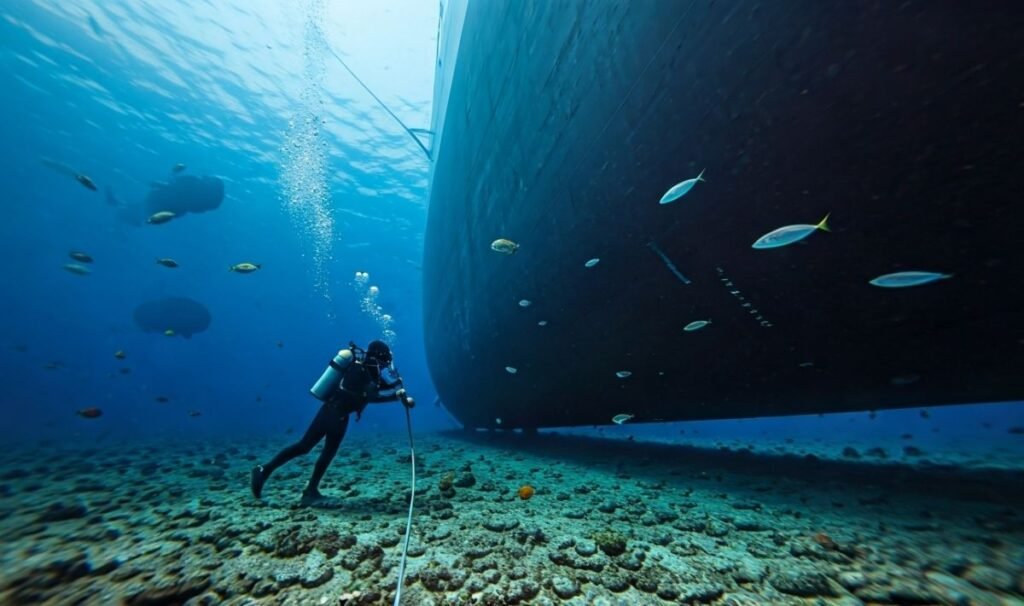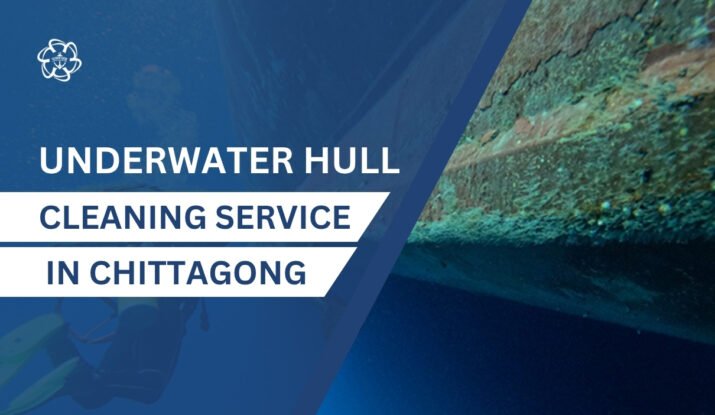Have you ever wondered what keeps those giant ships at Chittagong Port gliding smoothly through the water? It’s not just powerful engines or skilled crews—it’s also what happens beneath the surface. Underwater hull cleaning in Chittagong is the unsung hero of maritime efficiency, saving money, fuel, and the environment. In the busy shipping lanes of Chittagong, where every minute counts and every drop of fuel matters, hull cleaning is more than maintenance—it’s a necessity.
The Science Behind Hull Fouling in Chittagong
Imagine dragging a heavy net behind your bicycle. That’s what a ship experiences when marine organisms like barnacles, algae, and mussels attach themselves to the hull. This “biofouling” increases drag, forcing engines to work harder and burn more fuel. Over time, even a thin layer of slime can reduce a ship’s speed and efficiency by up to 10%. Left unchecked, heavy fouling can cost shipowners thousands in extra fuel every day and even damage expensive anti-fouling coatings.
Chittagong Port is the beating heart of Bangladesh’s international trade. Handling over 90% of the country’s import-export cargo, it’s a hive of activity with vessels arriving from all corners of the globe. The port’s tropical climate and nutrient-rich waters, however, accelerate marine growth on ships’ hulls. This makes regular underwater cleaning not just a good idea, but an operational must for vessels calling at Chittagong.

What Is Underwater Hull Cleaning in Chittagong?
Underwater hull cleaning in Chittagong is exactly what it sounds like: skilled divers or remote-operated machines remove biofouling from a ship’s submerged surfaces while it’s still afloat. This process targets the flat bottom, vertical sides, sea chest grates, rudder, and even the propeller. The goal? Restore the hull’s smoothness, reduce drag, and boost fuel efficiency—without the need for costly dry-docking.
Methods Used for Underwater Hull Cleaning in Chittagong
Underwater hull cleaning in Chittagong has evolved with technology. Here’s what’s commonly used:
- Rotating Brush Machines: These hydraulic carts scrub away barnacles and algae, leaving the hull clean but undamaged.
- High-Pressure Water Jets: For stubborn growth, water jets blast away fouling without harming the paint.
- Remote Operated Vehicles (ROVs): Some companies deploy ROVs equipped with cameras and cleaning tools, allowing for precise, diver-free cleaning, ideal for safety and efficiency.
- CCTV Inspections: Before and after cleaning, full video surveys document the hull’s condition, giving owners peace of mind and proof of service.
The best providers in Chittagong combine these methods for a tailored, thorough clean every time.
Environmental Impact and Green Practices of Underwater Hull Cleaning in Chittagong
The maritime world is under pressure to go green, and hull cleaning is no exception. Modern services in Chittagong are adopting eco-friendly practices:
- Filtration Systems: Advanced units capture debris and prevent harmful organisms from re-entering the port’s ecosystem.
- Biocide-Free Cleaning: Instead of harsh chemicals, most cleaning now relies on mechanical or water-based methods.
- Compliance with International Standards: Reputable companies follow IMO guidelines, ensuring safe, sustainable operations that protect both the ship and the sea.
By choosing green hull cleaning, shipowners help prevent the spread of invasive species and keep Chittagong’s waters healthy for future generations.
Key Benefits for Shipowners and Operators for Underwater Hull Cleaning in Chittagong
Why invest in regular underwater hull cleaning in Chittagong? The benefits are hard to ignore:
- Fuel Savings: A clean hull can cut fuel consumption by up to 15%, translating to massive cost savings on long voyages.
- Faster Turnarounds: Less drag means ships arrive and depart on schedule, keeping cargo moving and customers happy.
- Reduced Emissions: Lower fuel use means fewer greenhouse gases—good for the planet and your company’s reputation.
- Longer-Lasting Coatings: Gentle cleaning preserves expensive anti-fouling paints, reducing maintenance costs over time.
- Regulatory Compliance: Meet global environmental standards and avoid fines or delays.
Choosing the Right Underwater Hull Cleaning in Chittagong
Not all hull cleaning providers are created equal. Here’s what to look for:
- Experience and Certification: Choose companies with trained divers, proper licensing, and a proven safety record.
- Modern Equipment: The best results come from up-to-date tools, including ROVs and filtration units.
- Transparent Reporting: Insist on before-and-after video inspections and detailed service reports.
- 24/7 Availability: Shipping never sleeps—your cleaning service shouldn’t either.
A reliable partner will keep your fleet running smoothly and your costs under control.
The Future of Underwater Hull Cleaning in Chittagong
The industry is changing fast. As environmental regulations tighten and technology advances, expect to see more automation, smarter cleaning robots, and even real-time hull monitoring. Chittagong is poised to lead the way in South Asia, offering cutting-edge services that balance efficiency, safety, and sustainability. For shipowners, staying ahead of the curve means embracing these innovations and making hull cleaning a regular part of their maintenance strategy.
Conclusion: Smooth Sailing Ahead
Underwater hull cleaning in Chittagong isn’t just about keeping ships shiny—it’s about unlocking efficiency, protecting the environment, and ensuring the port remains a global maritime leader. By investing in regular, eco-friendly cleaning, shipowners can slash costs, boost performance, and sail confidently into the future. The next time you see a ship gliding effortlessly out of Chittagong, remember: it’s what’s beneath the surface that makes all the difference.
FAQ:
Q1. How often should ships undergo hull cleaning in Chittagong?
Most vessels benefit from cleaning every 3–6 months, depending on their routes and how quickly fouling builds up.
Q2. Can hull cleaning be done while cargo operations are underway?
Yes! Modern methods allow cleaning to happen alongside loading and unloading, saving valuable time.
Q3. Is underwater hull cleaning safe for the environment?
When performed by certified providers using filtration and eco-friendly techniques, it’s very safe and even helps prevent the spread of invasive species.
Q4. Does hull cleaning damage the ship’s protective coatings?
Not if done correctly. Professional services use gentle methods that clean without harming anti-fouling paints.
Q5. Why choose Chittagong for hull cleaning over other ports?
Chittagong offers skilled technicians, competitive pricing, and a strategic location on major shipping routes, making it a smart choice for global fleets.


